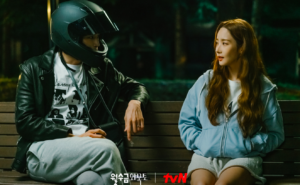
Marriage is a common expectation for many, but how can the societal pressures of marriage push people to find alternate solutions? In the drama Love in Contract, Choi Sang-eun (Park Min-young) and her business are one of these possible alternate solutions, as she is a “single life helper” that poses as a fake partner for her clients. Though the drama stays faithful to the tried-and-true romantic comedy genre, it raises interesting questions about the expectations of marriage and the role of love within it.
Written by Ha Goo-dam and directed by Nam Seong-woo, Love in Contract centres around Sang-eun, who runs her own business as a “single life helper”. Though she decides to stop her business, her feelings for her long-term client Jung Ji-ho (Go Kyung-po) complicates her decision. The love triangle is completed by her new celebrity client, A-list actor and secret chaebol heir Kang Hae-jin (Kim Jae-young), who is grappling with his own crush on Sang-eun.
This review contains spoilers
Sang-eun’s work as a “single life helper” has nothing to do with physical intimacy or companionship. Instead, by posing as a wife for her clients, who are all men, her work assists them to reap the benefits that come with being married. Whether those benefits are financial or social, Sang-eun focuses on how to best present herself and her client so that they appear as the perfect couple as demanded of her client’s specific situation. Depending on the client, Sang-eun does everything from attending her client’s high school reunion to organising an actual wedding. Sometimes, she even gets married legally; she has a string of divorces on her legal record, which is how Ji-ho, a judge, first notices her.
Sang-eun’s marriages and divorces through her business reinforces the separation between marriage and romantic connection. Marriage is an union between two people that binds them together socially and legally, which can provide a variety of financial, personal, and professional benefits, especially for men. Romantic connection is an entire separate phenomenon, though marriage is expected in many cases to be the final destination.

For Sang-eun’s clients, marriage is merely a step in the process of attaining freedom from various personal and societal pressures. For example, Sang-eun’s previous client and eventual best friend and roommate Woo Gwang-nam (Kang Hyung-seok), hires Sang-eun because he wants to escape his family nagging him about marriage and to convince them that he is straight, which he is not. Through his marriage to and divorce from Sang-eun, he is able to live without being subject to comments about marriage and his sexual orientation being called into question.
Love in Contract takes care to legitimise her business. Indeed, Sang-eun has a strict procedure when she screens potential clients, and she signs a contract with each client that sets out her terms and conditions and the deadline. She also terminates contracts when her clients breach the contract. For example, when she finds out a man has hired her to act as a mom to his child at a preschool event, she immediately nulls the contract and leaves. Her job is to perform strictly as a wife to a husband, not as a mother to children.
The lack of an obvious benefit is what sets her contract with Ji-ho apart. They meet three times a week for five years in the privacy of his own home and eat dinner together, where no one else can find out that he has a wife. Though they share very few words throughout their meals, the privacy and the absence of pressure to perform his role as her wife leads Sang-eun to regard him as a comforting, stable figure in her life. Similarly, Ji-ho, who struggles with initiating conversations and reading social cues, finds in Sang-eun a willing teacher in the comfort of his own home.
The development of their relationship is highlighted throughout the drama in a number of subtle ways. One example is Ji-ho’s wardrobe, which Sang-eun agrees to help improve. As a judge, he almost exclusively wears black suits outside of his home. With Sang-eun’s assistance, he slowly starts to incorporate colourful touches into his clothes, such as patterned ties that she picks out for him. Over time, his style changes drastically, and as his romantic relationship with Sang-eun develops, he starts to wear different types of clothing as well. When the two go through a rough patch in their relationship, his wardrobe also reverts to the drab colours and clothing from the beginning of the drama.

Despite its discussions of marriage and the wonderful development of Sang-eun and Ji-ho’s relationship, Love in Contract tends to play it safe with romantic comedy tropes. Sang-eun struggles with birth secrets and hiding her childhood chaebol status, which is a strong bonding point with Hae-jin.
Indeed, the last quarter of the drama tends to feel repetitive, with Sang-eun and Hae-jin’s chaebol families scheming against their wishes. Yoo Mi-ho (Jin Kyung), Sang-eun’s former nanny, who raised Sang-eun specifically to be a trophy wife to a chaebol, wreaks havoc in Sang-eun’s life despite Sang-eun providing her with a home and explicitly telling her not to do so. Hae-jin and Ji-ho, separately, block the chaebols’ attempts to use Sang-eun to their advantage without telling her.
Though these actions are done out of love and respect for Sang-eun, they contradict her characterization as an independent, capable individual and instead portray her as someone who has waited her whole life to be saved by a man she truly loves. Though Sang-eun is responsible for the final takedown of her enemies, the scenes leading up to it are frustrating and undermine her development throughout the drama.
Overall, however, Love in Contract is a solid romantic comedy with a unique take on marriage and its connection to romantic love. Sang-eun’s business adds a touch of originality to the drama, and Love in Contract is a recommended watch for fans of the fake relationship trope and other romantic comedy cliches in general.
(Images via tvN)


